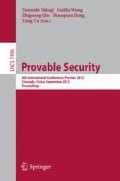Abstract
The Random Oracle model popularized by Bellare and Rogaway in 1993 has proven to be hugely successful, allowing cryptographers to give security proofs for very efficient and practical schemes. In this paper, we discuss the possibility of using an incompressible but fixed, ”algorithmically random” oracle instead of the standard random oracle and show that this approach allows for rather similar results to be proven but in a completely different way. We also show that anything provably secure in the standard random oracle model is also secure with respect to any algorithmically random oracle and then discuss the implications.
Access this chapter
Tax calculation will be finalised at checkout
Purchases are for personal use only
Preview
Unable to display preview. Download preview PDF.
References
Bennett, C.H., Gill, J.: Relative to a random oracle A, P A! = NP A! = co − NP A with probability 1. SIAM J. Comput. 10(1), 96–113 (1981)
Bellare, M., Rogaway, P.: Random oracles are practical: A paradigm for designing efficient protocols. In: ACM Conference on Computer and Communications Security, pp. 62–73 (1993)
Canetti, R., Goldreich, O., Halevi, S.: The random oracle methodology, revisited. J. ACM 51(4), 557–594 (2004)
Nielsen, J.B.: Separating Random Oracle Proofs from Complexity Theoretic Proofs: The Non-committing Encryption Case. In: Yung, M. (ed.) CRYPTO 2002. LNCS, vol. 2442, pp. 111–126. Springer, Heidelberg (2002)
Buldas, A., Laur, S., Niitsoo, M.: Oracle Separation in the Non-uniform Model. In: Pieprzyk, J., Zhang, F. (eds.) ProvSec 2009. LNCS, vol. 5848, pp. 230–244. Springer, Heidelberg (2009)
Beth, T., Dai, Z.-D.: On the Complexity of Pseudo-random Sequences - or: If You Can Describe a Sequence It Can’t Be Random. In: Quisquater, J.-J., Vandewalle, J. (eds.) EUROCRYPT 1989. LNCS, vol. 434, pp. 533–543. Springer, Heidelberg (1990)
Lutz, J.H.: Almost everywhere high nonuniform complexity. In: Structure in Complexity Theory, pp. 37–53 (1989)
Kautz, S.M., Miltersen, P.B.: Relative to a random oracle, NP is not small. Journal of Computer and System Sciences 53(2), 235–250 (1996)
Reingold, O., Trevisan, L., Vadhan, S.: Notions of Reducibility between Cryptographic Primitives. In: Naor, M. (ed.) TCC 2004. LNCS, vol. 2951, pp. 1–20. Springer, Heidelberg (2004)
Kolmogorov, A.N.: Three approaches to the quantitative definition of ’information’. Problems of Information Transmission 1, 1–7 (1965)
Chaitin, G.J.: On the length of programs for computing finite binary sequences. Journal of the ACM 13(4), 547–569 (1966)
Solomonoff, R.J.: A formal theory of inductive inference. Information and Control 7(2,3), 1–22, 224–254 (1964)
Levin, L.A.: Laws of information conservation (nongrowth) and aspects of the foundation of probability theory. Probl. Peredachi Inf. 10(3), 30–35 (1974)
Chaitin, G.J.: A theory of program size formally identical to information theory. Journal of the ACM 22(3), 329–340 (1975)
Claude, C.: Information and Randomness: An Algorithmic Perspective. Springer-Verlag New York, Inc. (1994)
Martin-Löf, P.: The definition of random sequences. Information and Control 9(6), 602–619 (1966)
Solovay, R.M.: A version of omega for which ZFC can not predict a single bit. Technical report, CDMTCS (1999)
Impagliazzo, R.: Very strong one-way functions and pseudo-random generators exist relative to a random oracle (1996) (manuscript)
Gennaro, R., Trevisan, L.: Lower bounds on the efficiency of generic cryptographic constructions. Electronic Colloquium on Computational Complexity (ECCC) 7(22) (2000)
Impagliazzo, R., Rudich, S.: Limits on the provable consequences of one-way permutations. In: Proceedings of 21st Annual ACM Symposium on the Theory of Computing, pp. 44–61 (1989)
Simon, D.R.: Findings Collisions on a One-Way Street: Can Secure Hash Functions Be Based on General Assumptions? In: Nyberg, K. (ed.) EUROCRYPT 1998. LNCS, vol. 1403, pp. 334–345. Springer, Heidelberg (1998)
Unruh, D.: Random Oracles and Auxiliary Input. In: Menezes, A. (ed.) CRYPTO 2007. LNCS, vol. 4622, pp. 205–223. Springer, Heidelberg (2007)
Author information
Authors and Affiliations
Editor information
Editors and Affiliations
Rights and permissions
Copyright information
© 2012 Springer-Verlag Berlin Heidelberg
About this paper
Cite this paper
Niitsoo, M. (2012). Deterministic Random Oracles. In: Takagi, T., Wang, G., Qin, Z., Jiang, S., Yu, Y. (eds) Provable Security. ProvSec 2012. Lecture Notes in Computer Science, vol 7496. Springer, Berlin, Heidelberg. https://doi.org/10.1007/978-3-642-33272-2_7
Download citation
DOI: https://doi.org/10.1007/978-3-642-33272-2_7
Publisher Name: Springer, Berlin, Heidelberg
Print ISBN: 978-3-642-33271-5
Online ISBN: 978-3-642-33272-2
eBook Packages: Computer ScienceComputer Science (R0)

